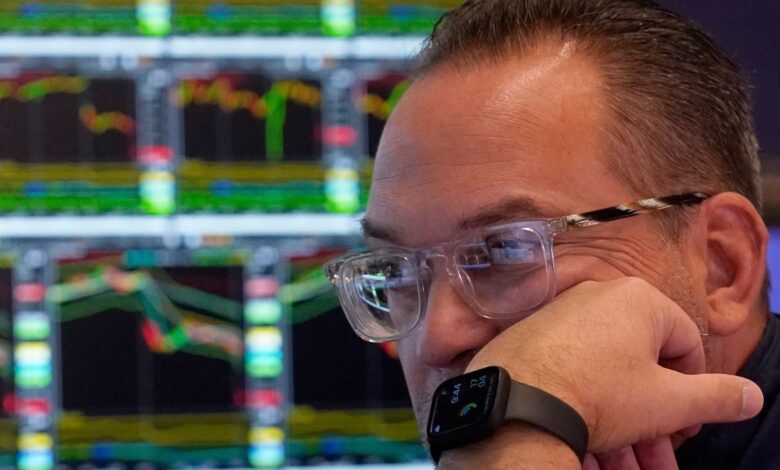Dow plunges 2,000 as sell-off for markets slams into a scarier gear following Trump’s tariffs | World News

The sell-off for financial markets worldwide is slamming into a higher, scarier gear on Friday. The S&P 500 tumbled 5.7% as Wall Street’s worst crisis since the COVID crash deepened after China matched President Donald Trump’s big raise in tariffs announced earlier this week.The move increases the stakes in a trade war that could end with a recession that hurts everyone. Not even a better-than-expected report on the U.S. job market, which is usually the economic highlight of each month, was enough to stop the slide.
The Dow Jones Industrial Average plunged 2,034 points, or 5%, and the Nasdaq composite was 5.6% lower, with an hour remaining in trading. So far there have been few, if any, winners in financial markets from the trade war.
Story continues below this ad
European stocks dropped roughly 5%. The price of crude oil tumbled to its lowest level since 2021. Other basic building blocks for economic growth, such as copper, also saw prices slide on worries the trade war will weaken the global economy.
China’s response to US tariffs caused an immediate acceleration of losses in markets worldwide. The Commerce Minry in Beijing said it would respond to the 34% tariffs imposed the US on imports from China with its own 34% tariff on imports of all US products beginning April 10. The United States and China are the world’s two largest economies.
Markets briefly recovered some of their losses after the release of Friday morning’s US jobs report, which said employers accelerated their hiring more last month than economs expected. It’s the latest signal that the US job market has remained relatively solid through the start of 2025, and it’s been a linchpin keeping the U.S. economy out of a recession.
But that jobs data was backward looking, and the fear hitting financial markets is about what’s to come. “The world has changed, and the economic conditions have changed,” said Rick Rieder, chief investment officer of global fixed income at BlackRock. The central question looking ahead is: Will the trade war cause a global recession? If it does, stock prices will likely need to come down even more than they have already. The S&P 500 is down roughly 17% from its record set in February.Story continues below this ad
Trump seemed unfazed. From Mar-a-Lago, his private club in Florida, he headed to his golf course a few miles away after writing on social media that “THIS IS A GREAT TIME TO GET RICH.”The Federal Reserve could cushion the blow of tariffs on the economy cutting interest rates, which can juice things encouraging companies and households to borrow and spend.
But the Fed may have less freedom to move than it would like. Fed Chair Jerome Powell said Friday that tariffs could also drive up expectations for inflation. That could be more damaging than high inflation itself, because it can drive a vicious cycle of behavior that only worsens inflation.
US households have already said they’re bracing for sharp increases to their bills. “Our obligation is to keep longer-term inflation expectations well anchored and to make certain that a one-time increase in the price level does not become an ongoing inflation problem,” Powell said. That could indicate a hesitance to cut rates because lower rates can give inflation more fuel.
Much will depend on how long Trump’s tariffs stick and what kind of retaliations other countries deliver. Some of Wall Street is holding onto hope that Trump will lower the tariffs after prying out some “wins” from other countries following negotiations.Story continues below this ad
Otherwise, many say a recession looks likely. Trump has said Americans may feel “some pain” because of tariffs, but he has also said the long-term goals, including getting more manufacturing jobs back to the United States, are worth it.
On Thursday, he likened the situation to a medical operation, where the US economy is the patient. “For investors looking at their portfolios, it could have felt like an operation performed without anesthesia,” said Brian Jacobsen, chief econom at Annex Wealth Management.
But Jacobsen also said the next surprise for investors could be how quickly tariffs get negotiated down. “The speed of recovery will depend on how, and how quickly, officials negotiate,” he said.
Trump said Friday that an official from Vietnam said his country already “wants to cut their Tariffs down to ZERO if they are able to make an agreement with the US” Trump also criticized China’s retaliation, saying on his Truth Social platform that “CHINA PLAYED IT WRONG, THEY PANICKED – THE ONE THING THEY CANNOT AFFORD TO DO!”Story continues below this ad
On Wall Street, stocks of companies that do lots of business in China fell to some of the sharpest losses. DuPont dropped 12% after China said its regulators are launching an anti-trust investigation into DuPont China group, a subsidiary of the chemical giant. It’s one of several measures targeting American companies and in retaliation for the US tariffs. GE Healthcare got 12% of its revenue last year from the China region, and it fell 14%.
In stock markets abroad, Germany’s DAX lost 5%, France’s CAC 40 dropped 4.3% and Japan’s Nikkei 225 fell 2.8%.In the bond market, Treasury yields fell, but they pared their drops following Powell’s caution about inflation.
The yield on the 10-year Treasury fell to 4.00% from 4.06% late Thursday and from roughly 4.80% early this year. It had gone below 3.90% in the morning.






